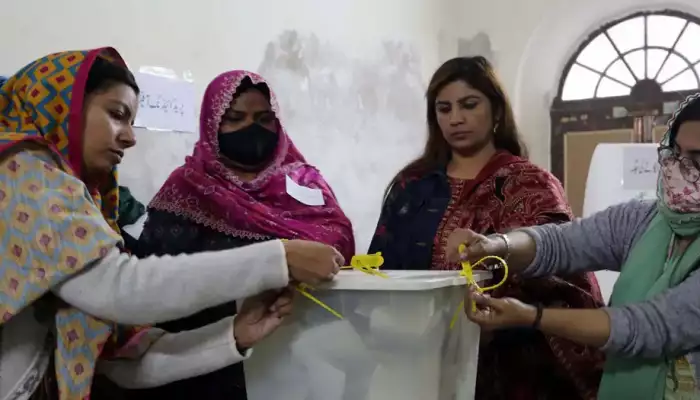
The February 8 elections have failed to end the political turmoil that has plagued Pakistan for almost two years.
Pre-election opinion polls had predicted a clear win for former Prime Minister Imran Khan's Pakistan Tehreek-e-Insaf (PTI) party in the 342-strong National Assembly, Pakistan's lower house of parliament. But the incarcerated ex-premier's party failed to secure a simple majority, according to unofficial results.
PTI-backed candidates are projected to win a little over 100 seats, while Khan's main rival and three-time former Prime Minister Nawaz Sharif's Pakistan Muslim League is likely to bag around 80.
The Pakistan People's Party, headed by Bilawal Bhutto-Zardari, has outperformed expectations by securing 50 to 60 seats and will likely be able to get the prime minister of its choice.
In the coming days and weeks, the Muslim-majority South Asian country will see intense political negotiations for a coalition government.
As Khan's candidates contested the polls as independents because the Supreme Court decided to take away their electoral symbol, their loyalty to their leader will now be tested. If some chose to side with Khan's political rivals, there would be no chance of the PTI returning to power.
"Imran Khan will be handling the party matters from jail. Khan's party will form a government in Khyber Pakhtunkhwa province and will likely be in opposition in the National Assembly. Despite his party gaining a considerable number of seats, his legal cases will reach a logical conclusion," Qamar Cheema, a political analyst in Islamabad, told DW.
Khan was barred from standing in the elections. He has been sentenced for many years in multiple cases related to corruption and leaking state secrets.
More instability ahead?
Many Pakistanis hoped that the February 8 elections would end the country's protracted political and economic turmoil. However, as no party has gained a simple majority in parliament, the bitter conflict between Khan and Sharif is unlikely to cease in the short term.
Pakistan is reeling from a grave financial crisis, high inflation, unemployment and environmental catastrophes, with many Pakistanis struggling to make ends meet and disillusioned by political leaders.
Saira Khan, a schoolteacher in Islamabad, said, "It doesn't matter who comes to power."
"Anybody who comes to power needs to bring political stability to the country, and it is not possible without developing trust among the public. So, elections are important, but I don't think it will make much difference," Khan told DW.
According to Maliha Lodhi, Pakistan's former representative to the United Nations, "Voters have delivered a split mandate."
"This is not good news for political stability," she added. "With no party able to secure an overall majority, the government formation will likely be a difficult affair."
Khan's supporters left frustrated
At the heart of Thursday's polls was a popular ex-premier who is challenging the military generals' iron grip on power.
In 2018, Khan's opponents had accused the military establishment of paving his path to office. But by the time an April 2022 no-confidence vote saw Khan ousted from the government, there was growing tension between him and the generals. Khan blamed the military — which has ruled Pakistan collectively for over three decades — for orchestrating the vote.
Khan also alleged that the US colluded with the military and his rival political parties to remove him from the premiership, a claim Washington has categorically denied.
After a yearlong confrontation with the military, Khan's supporters took to the streets across the country to protest his arrest. The protests turned violent. Some rioters began attacking military facilities and rampaging through army residential areas.
In the months following the riots, authorities started trying suspected protesters, including PTI members, in military courts. Droves of PTI senior and mid-level party officials announced their resignations and declared their backing for the military.
Khan's supporters hoped a "sympathy vote" for their imprisoned leader would see the PTI sweep the Thursday polls. It did not happen, and as the election commission delayed announcing election results, PTI officials and supporters cried foul and accused the authorities of rigging the vote in Sharif's favor.
Some PTI supporters told DW in Karachi that their party would have won an absolute majority had the election body not "changed results" overnight. Authorities reject these accusations as baseless.